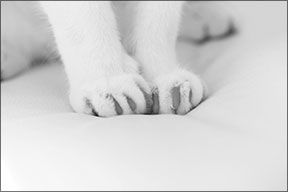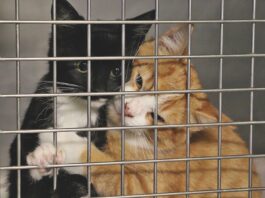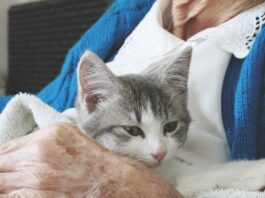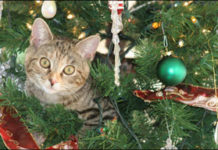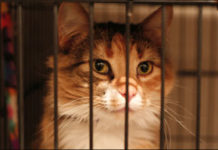Indoor Allergies and Your Cat
Though outdoor allergens (substances that can cause the immune system to respond with an allergic reaction), such as pollen, are considered to be the main culprits in causing allergies, indoor allergens, such as the common house dust mite, actually have the potential to be much more reactive. As humans, we generally have the most difficult time with indoor allergens when they are airborne and are inhaled into our upper respiratory tract. Though we consider our feline pets to be members of the family, most cats do not respond to airborne particles with an allergic reaction in the respiratory tract - unless the cat is asthmatic, notes William H. Miller, VMD, professor of medicine, chief of the section of dermatology, and medical director of Cornells Companion Animal Hospital.
Short Takes: December 2009
Pet Style News has awarded Soft-Hearted Products their "Editors Choice Award" for best pet memorial product. Every year, Pet Style News magazine searches for the most innovative new pet products. According to Pet Style News, the Soft-Hearted Pillow is "a major departure from the wood, ceramic and stone urns available on the market. This product gives the mourning pet owner a way to continue to hold and hug the lost pet in the form of a velvet-soft pillow with the pets ashes safely contained inside a zippered pouch at the center."
Hazards of the Holiday Season
Cats, being the inquisitive creatures they are, appreciate things that are new and different. Because the holidays bring an array of novel and interesting stimuli into the home, the curious kitty can certainly get into trouble. For the climbing kitty, a holiday tree offers the excitement of the outdoors inside the home, and even an undecorated tree is not without risk. Unless the tree is anchored, the results can be devastating. "Ive heard many stories about Christmas trees coming down," says Pamela Perry, DVM, lecturer in farm-animal behavior at Cornell Universitys College of Veterinary Medicine. Anchoring your tree to the ceiling or back wall with a cup hook and some wire or string may keep your cat and your tree from coming to harm.
Does Your Cat Love Too Much?
Cats learn to form attachments and to give and receive affection within the first weeks of life. If a human interacts with a kitten during those crucial weeks, the kitten is likely to enjoy human contact and even relish affection. Most cats and their human companions have similar needs for affection. Both enjoy being approached for petting or a cuddle. On the other hand, some companions complain that their cats are too standoffish, not letting them hold them or sit on their laps. But then theres the other group of companions who complain about their cats constant neediness, clinging and crying for attention.
Automatic Devices For Your Cat
Susan McDaniels was having a problem getting her cat, Starfish, to drink enough water. Starfish ignored the bowls of fresh water that were strategically placed around the house, preferring instead to drink water from a drippy faucet. Thats when McDaniels had an idea. What if she could provide fresh, running water for Starfish all the time? "I thought it would be a novel idea to get an automatic waterer for my cat," the Santa Barbara, California, resident remembers. "Nothing else was working." McDaniels went online and purchased an electric waterer that doubled as an attractive fountain. Most importantly, her cat was drinking more water. "Starfish now loves drinking water and finds the fountain very entertaining," she enthuses.
How Smart Is Your Cat?
Humans are very biased in assessing the intelligence of our cats (or dogs). Thats because we tend to judge them according to traits that we can relate to as humans. When cats do something entertaining or "display their independence, we think of them as intelligent," says Julia Albright, MA, DVM, animal behavior resident at Cornell Universitys College of Veterinary Medicine. But there is actually far more evidence for cats intelligence than just our perception of it. According to researchers at Tufts University School of Veterinary Medicine, the physical structure of our brain and that of cats are very similar; they have the same lobes in the cerebral cortex (the "seat" of intelligence) as we do. Our brains function the same way, conveying data via identical neurotransmitters.
Microchips to the Rescue
A study published in the Journal of American Veterinary Medical Association ("Characterization of animals with microchips entering animal shelters," July 2009) determined that 7,704 microchipped animals entered 53 animal shelters between August 2007 and March 2008. Of this number, strays made up more than half (53 percent), with the remainder considered as owner-relinquished animals (41.9 percent) and other (5.1 percent). The results showed that animal shelters were able to find the owners of three-fourths of stray dogs and cats with microchips. The sucess in finding owners was higher in dogs, animals that were purebred and animals that were spayed or neutered. Animal shelters had a much higher likelihood of finding an owner when the owner information was in the shelters own database or registered with a microchip registry. The results emphasize the importance of the registration process in successfully reuniting pets and owners.
Short Takes: 10/09
House Resolution 3501 - more commonly referred to as the Humanity and Pets Partnered Through the Years, or HAPPY Act - would amend the Internal Revenue Code to allow an individual to deduct up to $3,500 for "qualified pet care expenses."These expenses are defined as "amounts paid in connection with providing care (including veterinary care) for a qualified pet other than any expense in connection with the acquisition of the qualified pet." "Qualified pet" is defined as "a legally owned, domesticated, live animal." It does not include animals used for research or owned or used in conjunction with a trade or business. Introduced on July 31, the measure was drafted in conjunction with data from the American Pet Products Associations National Pet Owners Survey. It has been referred to the House Committee on Ways and Means. The Pet Industry Joint Advisory Council (PIJAC) issued a Pet Alert on Aug. 5 supporting the proposal. "Providing pet owners the opportunity to deduct pet care expenses is an important step towards ensuring that pet owners provide adequate veterinary and other necessary pet care," PIJAC stated. "It encourages responsible pet ownership and will hopefully reduce the abandonment of pets by people struggling as a result of the economic downturn."
Short Takes: 09/09
Governor Linda Lingle, accompanied by State Civil Defense Director, Major General Robert Lee, highlighted the importance of emergency preparedness by showcasing Hawaiis ongoing emergency shelter programs for people with special health needs and pet-friendly shelters. State Civil Defense, working with the State Department of Education, county civil defense agencies, American Red Cross, Department of Health, Hawaiian Humane Society and other public and private sector partners, has designated 158 facilities statewide that may serve as Special Health Needs shelters, and another 55 facilities that may be used as Pet-Friendly shelters. These shelters are located in separate rooms or buildings on public school campuses where general population emergency shelters are also located.
How to Curb Destructive Scratching
Not long after youve invested in new furniture, your cat picks her favorite spot. And its not where she wants to take a nap, either. Its the place shes chosen to give herself a pedicure, and soon that beautiful new sofa looks like its gone through a shredder. Why Cats Claw. You may notice your cat flexing her nails when she first gets up and stretches or suddenly stop to sink her nails into the wall-to-wall carpeting as she crosses a room. She may scratch at the end of a burst of energy after playing with her favorite toy. Fabrics, carpet, wood, cardboard anything in your house made of materials your cat can sink her nails into can become a target for her clawing. "Clawing helps them shed the outer layer of their nails," says Katherine Houpt, VMD, PhD, and the James Law professor of Behavior Medicine at Cornell Universitys College of Veterinary Medicine. In addition to having a practical purpose, clawing serves a more esoteric function. Cats indoors and out leave olfactory and visual signals on the surfaces of whatever material they claw. "Indoors, cats leave the marks on well-traveled areas like doorways or in more obvious locations like the ends of a sofa," says Dr. Houpt.
A Ban on Declawing?
The San Francisco Commission of Animal Control and Welfare wants the city to ban the declawing of cats. In a July hearing, the Commission voted 5 to 1 to recommend that the citys Board of Supervisors adopt an ordinance to ban the practice. (It would exclude cases where declawing is necessary for a cats health.) If passed, San Francisco will be the second city in the U.S. with such an ordinance. West Hollywood, CA, banned the practice in 2003.
Ask Elizabeth: 08/09
I have been purring nearly my whole life so I should be an expert! However, like many feline characteristics, purring is mysterious - even to me! Let me share what my friends at the Cornell Feline Health Center have to say about purring. At its core, purring is a means of communication - but cats purr in a variety of situations: when they are comfortable and content, of course, but also when they are anxious, injured or ill. What, exactly, a cat is communicating in these various situations is open to interpretation.

